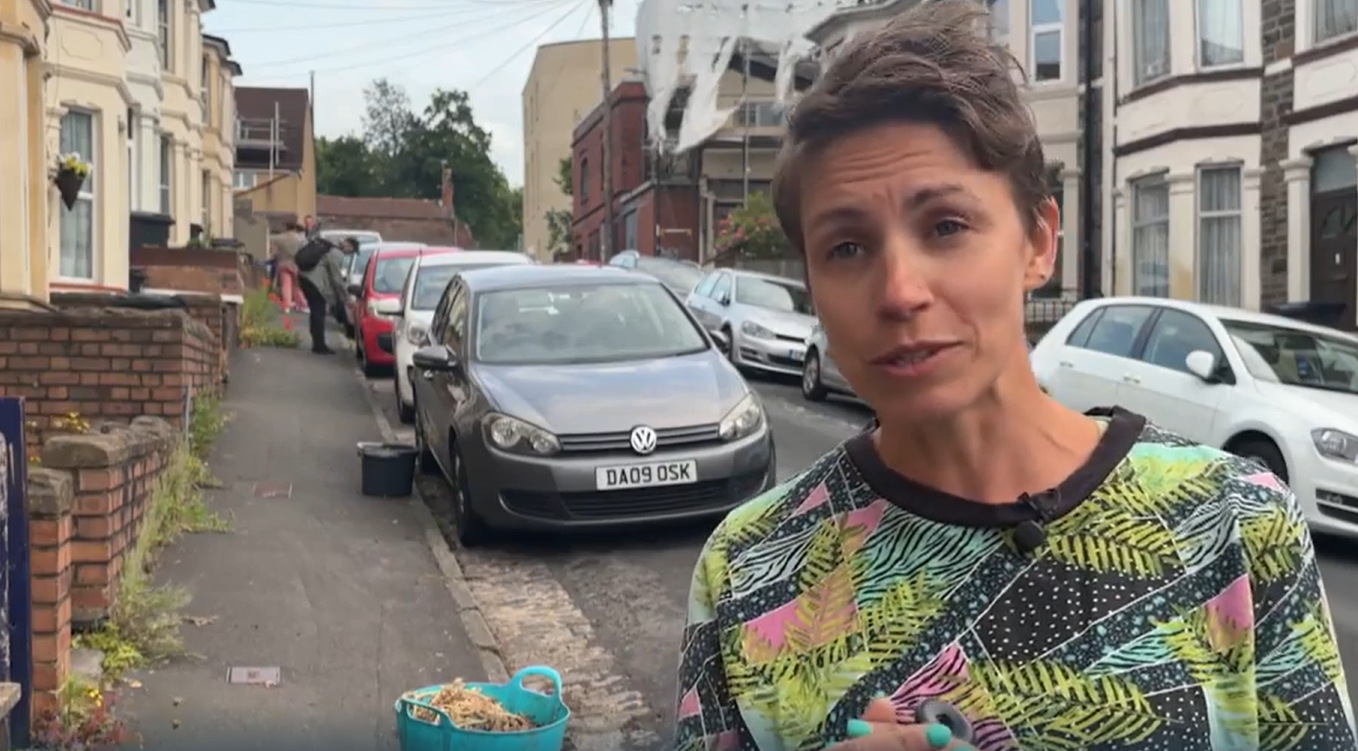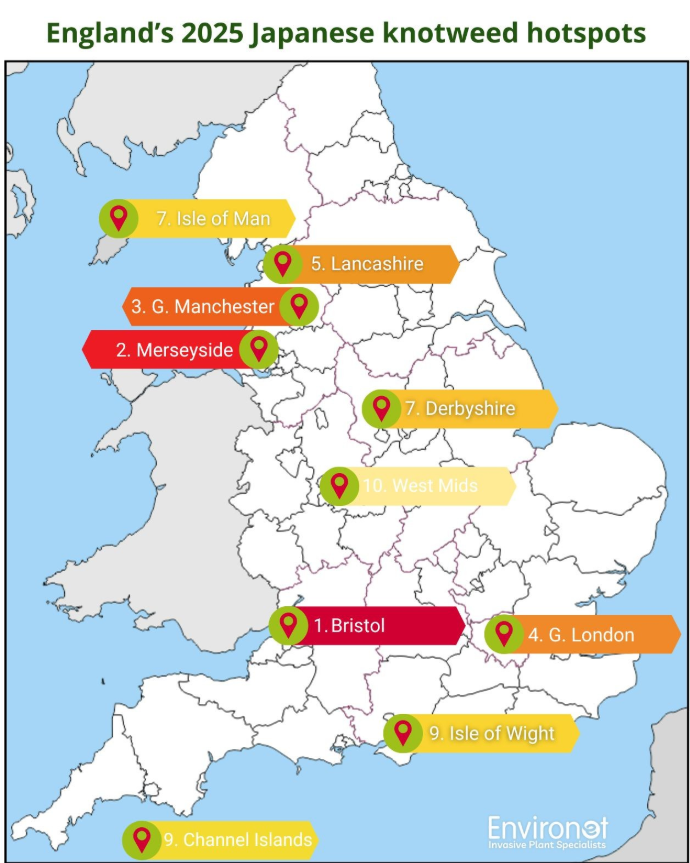Ecological Emergency Update - Weedkillers and Knotweed

In 2019 Bristol City Council passed a Silver Motion "Delivering the phasing out of pesticide/weed-killers in Bristol"
ending the use of such weed killers was a pledge in the Mayor Rees and Labour Party 2016 election vision statement.
to request the Mayor to commission a report that meaningfully tests and evaluates the practicality and the cost of alternative forms of treatment in parks and highways
In 2021 Bristol City Council declared a "Ecological Emergency" and published an action plan to deal with this emergency.
The council will review and reduce its current use of pesticides in response to the latest research and best practice in other cities. It will work closely with One City Partners in raising awareness of the impact of pesticides and importance of insects as part of a whole city approach that delivers at least a 50 per cent reduction in the use of pesticides by 2030.
It has been 4 years since this pledge was made, but what progress has been made?
In 2017 a Report on alternatives to using pesticides was published.

Questions asked in the report
- How affective is vinegar compared to glyphosate as an herbicide?
- How is the public responding to visual changes in parks and streets?
- What are the costs of alternative weed control?
- Will further reduction on herbicide application effect infrastructure?
- How and where can herbicide use be reduced without damage to infrastructure or increasing public concern?
Answers
How affective is vinegar compared to glyphosate as an herbicide?
For acetic acid and hand weeding the weeds started to re-emerging within a month, the interval of monitoring times. On comparison sites, treated with glyphosate, the weedines scores stayed low for five to six months. This is reflected in secondary research material studied. Acetic acid can be as effective as glyphosate in removing the surface appearance of weeds if used more frequently. However the cost becomes prohibitive.
How is the public responding to visual changes in parks and streets?
During the trial period only one weed treatment was completed with glyphosate resulting in some complaints. No guidelines have so far been used as for wished for outcomes of spraying or what is an acceptable level of weeds on streets. We know that the public does react to an increase in weeds on streets. We can also assume that, as most authorities across the UK and Europe carry out some method of weed control, this is because of their impact on the attractiveness of an area and the public response to that.
What are the costs of alternative weed control?
The BWC estimations mentioned earlier indicate 3.6 times higher costs for acetic acid applications and 6.5 times higher costs for hot foam treatment. However, BWC was not able to get quotes for either of the alternative treatments for the coming season as the contractors asked did not deem the alternatives as viable options.
Will further reduction on herbicide application effect infrastructure?
The Swedish study from 2006 after ten years of alternative weed control by municipalities recommends that the weed control efforts are greatly increased or start ripping out tarmac. The nationally important structures such as electricity substations and railroads have not introduced glyphosate bans as they have, despite efforts, not been able to find good enough substitute. The railways did find acetic acid good enough but the metal signal systems stopped future experiment although research did not show great corrosive effects on metal structures.
How and where can herbicide use be reduced without damage to infrastructure or increasing public concern?
In parks the reductions can be made in so called obstacle spray resulting in high grass round trees and poles. It might be more difficult to exclude spraying all together round fence lines as woody weeds will emerge with time. It should however be possible to use sprays only every other or third year if high grass round bases is visually acceptable.
For the street scene hard surface it will be more difficult. Parked cars will restrict the introduction of a machine based approach and affect cost. Defra recommend longer contracts which would allow the contractors to invest in specialist machines, especially applicators that use technology to detect weeds and measured amounts of herbicide going down to greatly limit the amount of glyphosate used. There are areas where spraying is needed for both visual amenity and for protecting infrastructure.
Opting Out Of Weed Spraying
Residents can opt out of having their streets sprayed with pesticides. But they have to agree to keep their street "weed free" of the Council will ignore their preference.
[insert neighbourhood association) recognise that this will require the road to have weeds removed by community volunteers to prevent the obstruction of paths and roads and prevent the destruction of the highway. The person or persons responsible for facilitating this activity are {insert names and contact details]. They will organise weeding at a suitable frequency to prevent obstruction and prevent reactive maintenance issues caused by vegetation growth.
We recognise the council will monitor the weed growth and maintenance requirements on [insert road] and that if weed growth is found to be causing obstruction and damage to the surface the road then the council may have to be return the area to the city weed spraying schedule. We acknowledge that nothing in this letter is intended to fetter the council’s discretion in the exercise of any of its functions. Where we identify the presence of Japanese Knotweed we will promptly advise the council of its location.
Residents who are interested in opting out of pesticide spraying on their street can complete this form and email it to [email protected]
You can watch this ITN News Report and hear residents talk about their experience of "self weeding".

Are we on track to reduce the use of pesticides by 50% by 2030?
In May 2024 Bristol 24/7 reported:
Former cabinet member for climate and ecology, Marley Bennett, said the council had only reduced its use by 18 per cent across its own land, because 50 per cent “is a challenging target to meet.”
BCC do not appear to report on the amount of pesticides used in Bristol.
The alternatives are much more expensive and BCC cannot afford to increase the budget for weed clearing.
The option of expecting residents to weed their own streets might work where there are people who are willing to clean their whole street, but it is unlikely that this will work for more than a handful of streets.
The option of just letting the weeds grow is likely to be unacceptable to the majority of residents and would also result in damage to infrastructure that would cost a lot of money to fix.
Knotweed
We have not made much progress in reducing the use of pesticides, but Bristol is the "best" at letting Japanese Knotweed get a foothold.
Bristol has been named the top hotspot for Japanese knotweed in England, with 33.91 cases per square mile, according to data from Environet’s Exposed: The Japanese Knotweed Heatmap.

So far in 2025 there gave been 9 reports made on FixMyStreet about Knotweed.

The Council publish information about Knotweed:
"It causes problems because it:
- can force its way through concrete or brick, so can damage buildings or roads
- grows in thick clusters, which means native plants can't grow
- is very difficult to get rid of
You must stop Japanese knotweed spreading from your land. You could be prosecuted if you allow it to spread onto someone else's property."
Weed Complaints
Reports about "weeds" on FixMyStreet have risen each year and the figures for the first half of 2025 already exceed the total reports made in 2024.
This shows that people are unlikely to be happy if the Council decide to stop their weed control work and "re-wild" the city.

What do other Councils do?
Flintshire Council
Councillor David Healey, who holds the portfolio for Climate Change and Economy, underlined the urgency of finding alternatives.
“The use of Glyphosate, a herbicide that indiscriminately kills vegetation and can contaminate watercourses, presents risks we can no longer ignore. Exploring and adopting alternative weed control measures is not just a choice but a necessity,” he stated.
Approval was also given for the targeted reduction of pesticides and the use of alternatives, such as mechanical removal of weeds or organic sprays or opt-out schemes. This involved stopping the use of chemical herbicides within town centres, school grounds and green spaces, for example in parks or recreational areas, along with excluding the use of chemical herbicides in contracted services, such as the schools’ grounds maintenance contract, and using alternative weed control methods instead (e.g. heat-based methods, organic sprays, manual/mechanical removal methods).
In terms of weed control, we have continued to look for alternatives to using chemical pesticides throughout the season and we have trialled different products and methods, including organic herbicides hot foam treatment (i.e. known as foam-stream), heat treatment, weed ripping and some degree of manual hand weeding. However, these usually require a second treatment and can be more expensive. In previous years, external contractors have typically performed one or two sprays per year, and this too has had very limited effect.
Whilst we do adopt manual hand pulling weeds in some specific settings, this approach is very time consuming and financially unviable to use across the entire county. Weeds must be removed from the root to ensure they are effectively destroyed and so, each weed must be dug out carefully before pulling. In addition to this, we employ completely chemical-free options such as two small sweepers, which can remove silt and debris, and a mechanical ‘weed ripper’ that attaches to the sweepers. Our street cleansing teams are also required to “side out” or “edge out” footpath edges. Some alternative means, such as not treating perimeters of parks and open spaces, adding more wildflower meadows, and additional tree planting to further encourage habitat, wildlife, and biodiversity, are also being explored. We will carry out further trials in 2025, in conjunction with the foamstream, to assess the efficacy of the latest version of their chemical free treatment method.
West Sussex Council
December 2022 (Note 45):
West Suffolk District, Suffolk Have announced they are to stop the general use of glyphosate from April 2023 to help protect wildlife and the environment. They have attributed an extra £20,000 to their budget to adopt alternatives, and are encouraging residents to accept more weeds.
This report recommends a return to the controlled use of appropriate chemicals (including Glyphosate) to control unwanted vegetation and weeds in very strictly defined areas of the district.
Unwanted vegetation growth has led to a rise in complaints, diverts scarce resources from other tasks and can cause accelerated deterioration to infrastructure which will be costly to repair. Suffolk County Council Highways returned to using Glyphosate from April 2024, having established, as we have, that other forms of treatment are impractical and costly.
Under these proposals, the Council’s use of Glyphosate will be exclusively limited to hard landscaped areas and around man-made structures. This will have minimal biodiversity impact.
Its application will be controlled to minimise the impact on pollinators in terms of both timing and through avoiding plants that are in flower.
The Council will continue to explore alternative methods of vegetation control to minimise the use of chemicals.
Glastonbury Town Council
June 2015:
a Notice of Motion was submitted to a meeting of Glastonbury Council for consideration. The Motion, put forward by Councillor Alyson Black and seconded by Councillor Emma George, called for the banning of use of all products containing glyphosate in the public areas of the town.

Current Statement in the Climate Emergency Report:
We have also made our planting areas Glyphosate free zones by introducing a new weed control system.
Lambeth Council
Cllr Danny Adilypour, joint Cabinet Member for Sustainable Transport, Environment and Clean Air, said: “We are committed to addressing the climate emergency. Our commitment to reduce our environmental impact and make sure Lambeth is a place people want to live, work and invest in is clearly set out in the Borough Plan.
“We listen to residents’ concerns and act where we can and where we know it will make a difference. From October 2021, year-round chemical-free manual weed control will be introduced with the new Waste, Recycling and Street Cleansing contract.”
As part of our commitment to phase out glyphosate the council also offered residents the chance to opt their street out of the weed spraying schedule and take responsibility for keeping their street free of weeds.
Now that all weeding is done manually by our contractors, the threat of any potential problems caused by glyphosate has been removed. However, the community weeding scheme also proved popular because it allowed weeds the chance to flower and contribute to local biodiversity. Many communities found it interesting to observe the rich variety of plants that grew around trees and on pavements.
A local botanist counted 47 plant species growing around trees and on the pavement of her short street in Kennington. This diversity is key to supporting a wide variety of insects and other wildlife. Because of this we are continuing the Community Weeding Scheme, with a renewed focus on encouraging biodiversity while at the same time removing plants that could damage walls and pavements, as well as any that could cause a trip hazard.
December 2023: Less than half of Lambeth residents think that they live on a clean street
It has been acknowledged that chemical free weed management has presented challenges over the past year. Currently operating in the third year since the final weed spray was undertaken, it is apparent that the weed control approach needs to remain fluid to enable continued adaptation as weed growth rates and patterns continue to evolve year on year. Despite increasing the dedicated manual weed control resources by 10 additional full-time operatives this year, the pace at which weeds regrow has been notably faster than the scheduled removal cycle. The presence of weeds currently divides opinion between people wanting to embrace biodiversity and others perceiving them as a sign of deterioration.
Petition to "Cease Bristol Waste's Use of Toxic Chemicals on our Pavements"
This petition states:
We have a responsibility to foster wildlife friendly practices in our urban spaces - not compromise them. Reducing the use of harmful chemicals in Bristol is a necessary step towards sustainable urban living. We, the residents and wildlife of Bristol, urge our council to halt the use of toxic chemicals on our pavements. It's time for Bristol Waste to adopt eco-friendly alternatives and help us foster a safer, greener community. Join us in this plea for environmental conscience. Kindly add your name to our petition.
The challenge is that the "ec0-friendly alternatives" are very expensive and would require an increase in Council Tax to fund. Or it would need all Bristol residents to commit to hand weed the city themselves.
Planters and Street Furniture
The introduction of more street furniture in Bristol (e.g. Planters) mean that there are more areas that need weed control.
Complaints about Planters have dramatically increased this year.

What does the future look like?
This AI generated image shows what City Hall might look like if weed control was stopped. Is this the "bio-diverse" future you would like to see?


Comments ()